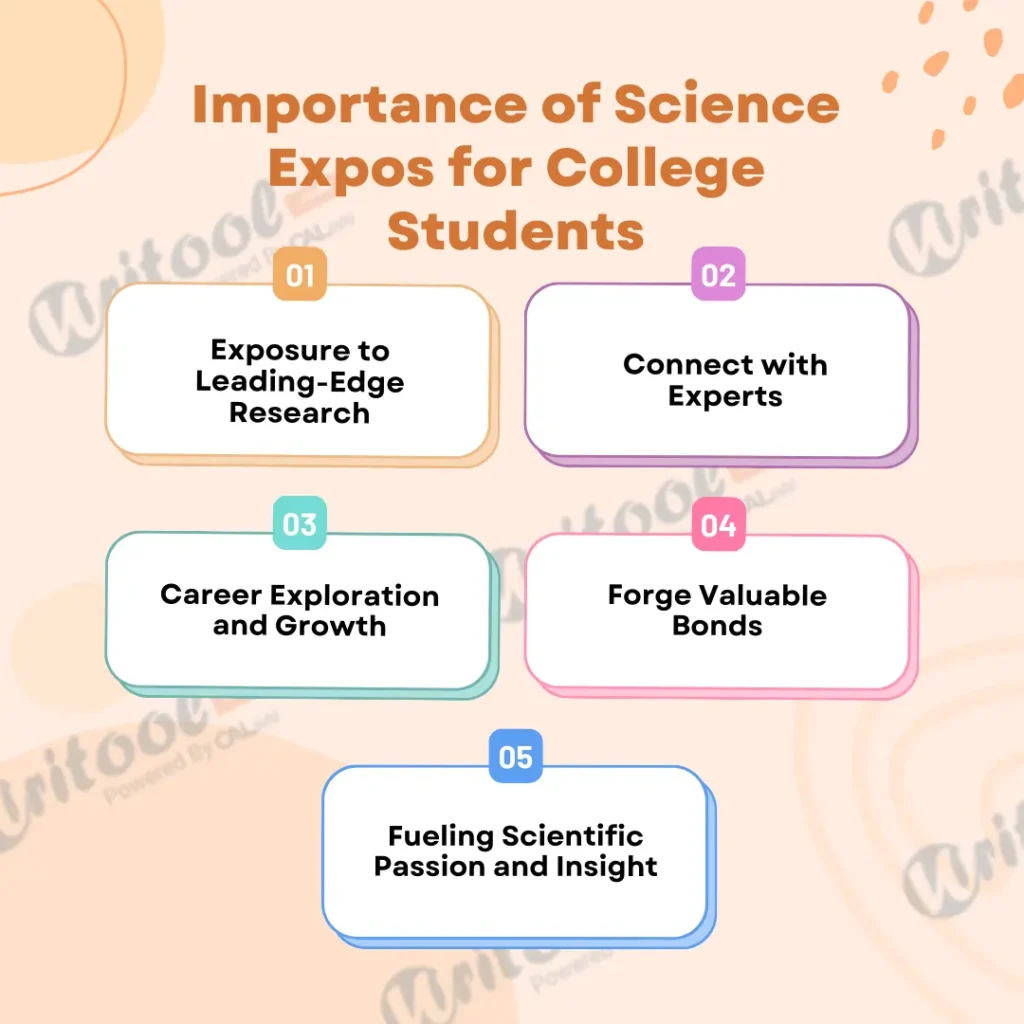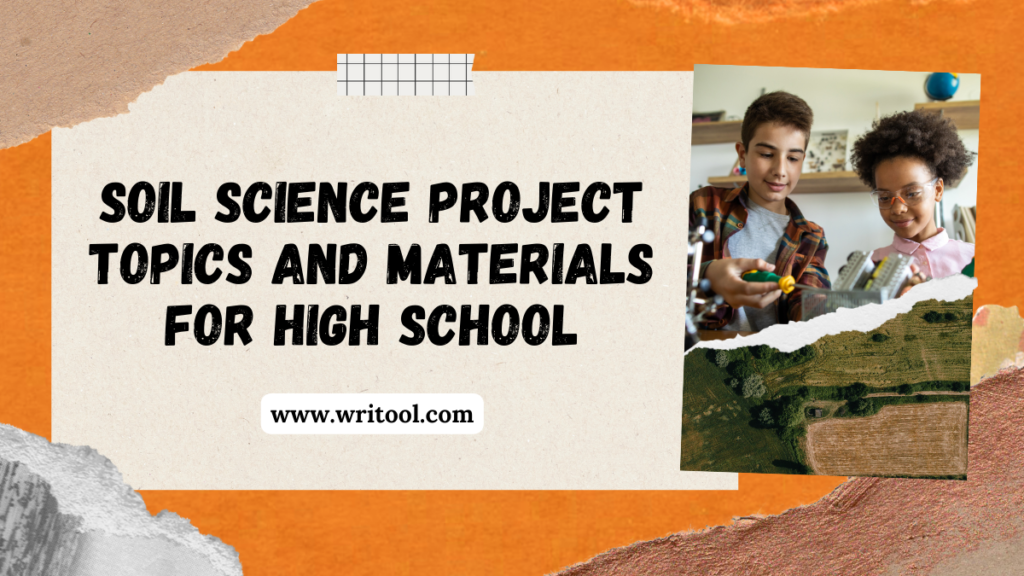Unlock the door to captivating science expo topics for college students right here! From combating climate change to venturing into the cosmos, ignite your imagination and prepare to dazzle with your upcoming project.
Greetings, fellow scholars! Familiar with science expos? They’re not merely gatherings where folks in lab coats discuss intricate matters. Oh no, they’re vibrant showcases where we flaunt our scientific acumen and ingenuity.
Within this piece, we plunge into the realm of science expo themes curated especially for us, the collegiate crowd. We’ll guide you in selecting a topic that’s both captivating and feasible, ensuring your presentation is nothing short of impressive.
Introduction to Science Expos
Science expos are like treasure chests full of curiosity, discovery, and innovation. They’re great because you can:
- Explore cool science stuff: Check out fun exhibits, watch awesome experiments, and learn about new science.
- Get excited about science: Whether you love science or are just starting, expos can make you want to learn more about how the world works.
- Meet cool scientists: Talk to the people who are discovering new things. They can tell you about their work and inspire you to do your own science.
- See science happening: Watch science in action with robots, demos, and fun displays that show how things work.
Have a blast!: Expos are fun! There are games, activities, and challenges for all ages.
Different kinds of science expos
- School science fairs: Where students show off their projects.
- Museum science expos: Deeper dives into different science topics.
- Community science expos: Celebrate local science and connect people with what’s happening in their area.
- Big science festivals: Huge events with scientists and companies from all over showing off the latest cool stuff.
Importance of Science Expos for College Students
Science expos hold a trove of advantages tailored for college students like yourself. Here’s why attending one is a smart move:

Exposure to Leading-Edge Research
- Stay updated: Peek into the newest breakthroughs within your field or areas you’re interested in. Expos spotlight pioneering research that might not have hit textbooks yet.
- Expand your view: Explore scientific fields beyond your major. This can spark fresh ideas, reveal potential research partnerships, or even unveil a newfound passion.
Connect with Experts
- Forge relationships: Engage with top scientists and researchers. Pose questions, discuss their work, and glean insights from those shaping the future of science.
Career Exploration and Growth
- Discover career avenues: Expos often showcase presentations and booths from various companies and research institutions. Gain insights into diverse science careers and uncover job prospects.
- Refine professional skills: Sharpen your science communication by conversing about complex topics with researchers and fellow attendees. Polish your presentation prowess if you’re participating or volunteering.
Forge Valuable Bonds
- Network with professionals: Connect with individuals in your field of interest. These connections might open doors to internships, research roles, or future job opportunities.
Fueling Scientific Passion and Insight
- Reignite curiosity: Immerse yourself in the thrill of scientific exploration. Interactive exhibits and captivating demonstrations can reignite your love for science.
- Deepen comprehension: Expos provide a platform to delve into specific scientific concepts. Witness their real-world applications and gain a more comprehensive understanding.
- Spur innovation: Draw inspiration from innovative projects and presentations. They can fuel your own ideas for future research or personal endeavors.
Selecting a Science Expo Topic
Choosing a science expo topic for college can be both fun and tough. Here’s how to do it:
Think about what you like
- What areas of science are interesting to you? Genetics, space, AI, ecosystems? Think about what grabs your attention.
- Consider what you’re good at in school. Using what you know can make things easier.
See what’s going on
- What’s new in your field? Look for recent discoveries, debates, or big questions.
- Read science news or watch documentaries to get ideas.
Pick something specific
- Science is huge, so narrow it down. Instead of “climate change,” maybe look at “how it affects coral reefs.”
Get creative
- Once you have ideas, think about experiments or projects to show off your topic.
- Make sure it’s doable. Can you get what you need to do your project?
Talk to your professors
- Share your ideas with them. They can help you and make sure your topic is good.
Extra tips
- Being original is great! A new idea can make your project stand out.
- Think about who will see your project. Make it fit for them—whether it’s people, other students, or judges.
- And most importantly, pick something you love! Your excitement will make your project better.
With these steps, finding the right science expo topic for college will be a breeze!
Science Expo Topics for College Students
Check out popular science expo topics for college students:-
Biology and Life Sciences
- Genetics and DNA sequencing
- Evolutionary biology
- Human anatomy and physiology
- Microbiology and infectious diseases
- Ecology and environmental science
- Botany and plant biology
- Zoology and animal behavior
- Neurobiology and brain science
- Immunology and autoimmune diseases
- Marine biology and oceanography
Chemistry
- Chemical reactions and kinetics
- Organic chemistry and synthesis
- Biochemistry and molecular biology
- Nanotechnology and materials science
- Environmental chemistry
- Analytical chemistry techniques
- Polymer chemistry
- Medicinal chemistry and drug development
- Quantum chemistry
- Green chemistry and sustainable practices
Physics
- Quantum mechanics and particle physics
- Astrophysics and cosmology
- Thermodynamics and statistical mechanics
- Electromagnetism and electricity
- Optics and photonics
- Acoustics and sound waves
- Fluid dynamics and aerodynamics
- Nuclear physics and fusion energy
- Condensed matter physics
- High-energy physics experiments
Earth Sciences
- Geology and plate tectonics
- Meteorology and atmospheric science
- Climatology and climate change
- Hydrology and water resources
- Soil science and agriculture
- Volcanology and natural disasters
- Remote sensing and GIS technology
- Oceanography and marine geology
- Paleontology and fossil studies
- Environmental conservation and restoration
Technology and Engineering
- Robotics and automation
- Artificial intelligence and machine learning
- Aerospace engineering and space exploration
- Renewable energy technologies
- Biomedical engineering and prosthetics
- Civil engineering and infrastructure
- Nanotechnology applications
- 3D printing and additive manufacturing
- Internet of Things (IoT) devices
- Smart cities and urban planning
Health and Medicine
- Epidemiology and public health
- Cancer research and treatment
- Neurology and brain disorders
- Cardiology and heart health
- Diabetes prevention and management
- Immunotherapy and personalized medicine
- Mental health and psychology
- Nutrition and dietary science
- Stem cell research and regenerative medicine
- Global health challenges and solutions
Environmental Science
- Renewable energy sources
- Climate change mitigation strategies
- Pollution control and remediation
- Sustainable agriculture practices
- Biodiversity conservation efforts
- Waste management and recycling technologies
- Green infrastructure and urban ecology
- Ecosystem restoration projects
- Renewable energy policy and advocacy
- Environmental education and awareness campaigns
Space and Astronomy
- Exoplanet discoveries and characterization
- Space telescopes and observatories
- Lunar exploration missions
- Mars colonization plans and challenges
- Black holes and gravitational waves
- Cosmic microwave background radiation
- Asteroid detection and planetary defense
- Space tourism industry developments
- Search for extraterrestrial life
- Space debris mitigation strategies
Mathematics and Computer Science
- Cryptography and cybersecurity
- Algorithm optimization techniques
- Big data analytics and data visualization
- Graph theory and network analysis
- Computational biology and bioinformatics
- Machine learning algorithms
- Game theory and decision making
- Mathematical modeling in physics
- Computer graphics and animation
- Artificial life simulations
Social Sciences
- Anthropology and human evolution
- Sociology of technology and innovation
- Political science and policy analysis
- Economics of sustainability
- Psychology of decision making
- Linguistics and language acquisition
- Cultural studies and diversity
- Education reform and learning strategies
- Gender studies and equality initiatives
- History of science and scientific revolutions
Education and Outreach
- STEM education initiatives
- Science communication strategies
- Citizen science projects
- Educational games and apps
- Science fair project ideas
- Hands-on science demonstrations
- Outreach to underrepresented communities
- Teacher training workshops
- Science journalism and media literacy
- Science-themed art and literature
Energy and Sustainability
- Solar energy technologies
- Wind power generation
- Hydroelectricity and tidal power
- Geothermal energy systems
- Energy storage solutions
- Energy-efficient building design
- Transportation electrification
- Sustainable agriculture techniques
- Circular economy models
- Community-based energy initiatives
Biotechnology
- Genetic engineering applications
- Biopharmaceutical production
- CRISPR-Cas9 gene editing technology
- Synthetic biology projects
- Biofuel production processes
- Tissue engineering and organ transplantation
- Bioremediation strategies
- Biosensors and diagnostic tools
- Biodegradable materials development
- Biomanufacturing innovations
Robotics and Automation
- Autonomous vehicles and drones
- Human-robot interaction studies
- Soft robotics and flexible actuators
- Swarm robotics systems
- Industrial automation technologies
- Robotic exoskeletons for rehabilitation
- Agriculture robotics applications
- Underwater robotics exploration
- Space exploration rovers
- Bio-inspired robotic designs
Materials Science
- Nanomaterials synthesis methods
- Advanced materials characterization techniques
- Biomaterials for medical implants
- Smart materials with responsive properties
- Self-healing materials development
- 3D printing with novel materials
- Composite materials for aerospace
- Sustainable packaging materials
- Metal-organic frameworks (MOFs)
- Functional coatings and surface treatments
Agriculture and Food Science
- Precision agriculture technologies
- Genetic modification of crops
- Vertical farming and urban agriculture
- Food safety and quality assurance
- Aquaponics and hydroponics systems
- Sustainable fisheries management
- Crop disease management strategies
- Alternative protein sources
- Food waste reduction initiatives
- Agroecology and permaculture practices
Innovation and Entrepreneurship
- Startup incubation programs
- Venture capital funding in tech
- Intellectual property rights in science
- Innovation ecosystems and clusters
- Crowdfunding for scientific projects
- Accelerators for biotech startups
- Social entrepreneurship in STEM
- Tech transfer from academia to industry
- Patenting strategies for inventors
- Science-based entrepreneurship courses
Future Technologies
- Quantum computing developments
- Brain-computer interfaces (BCIs)
- Augmented reality (AR) applications
- Space elevators and megastructures
- Fusion energy reactor designs
- Hyperloop transportation systems
- 5G network infrastructure
- Personalized medicine advancements
- Autonomous flying taxis
- Lunar and Martian colonization plans
Science Policy and Ethics
- Ethical implications of AI
- Privacy concerns in genetic testing
- Regulation of biotechnology
- Open access publishing models
- Science diplomacy initiatives
- Climate change policy debates
- Funding challenges in science
- Research integrity and reproducibility
- Science education policy reforms
- Responsible conduct of research guidelines
STEM Careers and Mentorship
- Women in STEM initiatives
- Diversity in tech and science
- STEM mentorship programs
- Career pathways in academia
- Industry-academia collaborations
- Internship opportunities for students
- Entrepreneurial mindset in STEM
- Science communication careers
- Science policy fellowships
- STEM outreach ambassador programs
Tips for a Successful Science Expo Project
Check out the tips for a successful science expo project:-
Project Selection and Planning
- Pick a topic you like and can research easily.
- Focus on a small part of the topic to study deeply.
- Ask a clear question that guides your research.
Research and Experimentation
- Look for information in books and online.
- Make sure your experiment is clear and fair.
- Write down everything you do in your experiment.
Presentation and Communication
- Make your display board neat and easy to understand.
- Practice talking about your project clearly and briefly.
- Adjust how you talk depending on who you’re talking to.
Polish and Professionalism
- Check for mistakes in your writing and fix them.
- Dress neatly and be confident when presenting.
- Be ready to answer questions about your project.
Additional Tips
- Show that you care about your project to get others interested.
- Plan your time well so you finish on time.
- Ask for help if you need it from teachers or friends.
- See this as a chance to learn and have fun with science!
Following these simpler tips will help you do a great job with your college science expo project!
Science Expo Topics for College Students Based on Skills
Check out science expo topics for college students based on skiils:-
Research and Analysis
- Study pollution’s effect on local nature.
- Test a new health program’s success.
- Look at social media’s impact on mental health.
- Analyze space data for star formation.
- Explore new medicines for diseases.
Communication and Presentation
- Explain how the brain affects behavior.
- Show why biodiversity matters.
- Demonstrate a robot’s abilities.
- Do an exciting chemistry experiment.
- Explain complex physics concepts.
Technical and Laboratory Skills
- Analyze DNA to learn about genetics.
- Test new materials for their uses.
- Make a program to solve a science problem.
- Build a model to show a new idea.
- Study rocks to understand their history.
Creativity and Innovation
- Find ways to reduce ocean plastic.
- Design a home for another planet.
- Teach a computer to learn a new task.
- Build something using solar or wind power.
- Discover new uses for tiny materials called nanomaterials.
These are easy starting points. Use them to create your own awesome science project!
Science Expo Topics for College Students Based on Interest
Check out science expo topics for college students based on interest:-
Space
- Living on Other Planets: Explore Mars or Moon habitats.
- Sustainable Space Homes: Design long-lasting space shelters.
- Asteroid Dangers: Study risks from space rocks.
- Celestial Mission: Plan a trip to a comet or moon.
- Star Formation: Learn how stars and galaxies form.
Health
- Personalized Medicine: Treat based on genes.
- Gut Bugs and Health: Study stomach bugs and wellness.
- Gene Editing Ethics: Discuss changing DNA and problems.
- New Medical Gadgets: Invent tools for sick people.
- Disease Spread Stopper: Find ways to stop illnesses.
Environment
- Renewable Energy: Research solar or wind power.
- Tiny Plastic Study: Investigate small plastics in your area.
- Beach Cleanup Solution: Clean up beaches or oceans.
- Climate Change Effects: See how global warming affects weather.
- Green City Design: Plan an eco-friendly town.
Tech
- Smart Computers: Explore how computers help in different areas.
- Self-Learning Program: Make a computer program that learns.
- Driverless Car Ethics: Talk about problems with driverless cars.
- Cool Robot Build: Make a robot that does something fun.
- New Tech Discovery: Learn about 3D printing or tiny tech.
Animals
- Animal Weather Survival: Study how animals cope with hotter weather.
- Animal Talk: Learn how animals communicate.
- Animal Medical Help: See how animals help sick people.
- Save Endangered Animals: Find ways to protect endangered species.
- Animal Home Destruction: Study how people harm animal homes.
Pick a project you like and have fun!
Science Expo Topics for College Students Based on difficulties
Check out science expo topics for college students based on difficulties:-
Beginner Level
- Cleaning Products Test: Try different cleaners on stains.
- Social Media and Sleep: Ask how social media affects sleep.
- Music and Plant Growth: Play music for plants and observe growth.
- GMO Public Opinion: Survey thoughts on genetically modified organisms.
- Renewable Energy Trends: Check online data on renewable energy growth.
Intermediate Level
- Water Quality Test: Check local water for pH and bacteria.
- Light Color and Plants: See if different lights help plants grow.
- Essential Oils and Bacteria: Test if oils kill bacteria.
- Composting Materials: Compare materials for composting.
- Model Solar Cell: Build a simple solar cell and test it.
Advanced Level
- New Biofuel Sources: Research new materials for fuel.
- Machine Learning Models: Create a program that learns tasks.
- Microplastics and Marine Life: Study plastic effects on sea life.
- Disease Spread Modeling: Use a computer to predict disease spread.
- Exoplanet Data Analysis: Analyze telescope data for new planets.
Choose a project that interests you and fits your skills!
What is the best topic for science expo?
Finding the right topic for a science expo can be tricky! Consider these factors:
- What you like: Choose something you enjoy.
- What you’re good at: Pick a topic that matches your skills.
- What you can do: Make sure you have what you need.
- Be unique: Find an interesting angle.
- Know your audience: Adjust to who’s watching.
How to find your topic
- Look at what’s happening in your area.
- Read news or watch videos for ideas.
- Think of ideas and ask for advice.
Pick something you’re excited about and can do well.
Which topic is best for science models?
To choose the best science model topic, think about:
- What interests you most: Pick something you love.
- What you want to show: Decide if you’re explaining a concept, showing a real use, or making something cool.
- How hard it is: Consider if you have the skills and stuff you need.
- How impressive it is: Aim for something eye-catching and unique.
Here are some topic ideas
Interest & Demonstration
- Biology: Make a DNA model or a 3D heart to show how bodies work.
- Chemistry: Build a molecule model to explain chemical bonds.
- Physics: Create a solar system model or a bridge to show how things move.
- Earth Science: Build a mountain map or a volcano model to explain land changes.
Real-World Application
- Engineering: Design a prosthetic limb or a wind turbine model to show real uses.
- Environmental Science: Make a city model or show deforestation effects.
- Medicine: Build a surgical robot or a 3D-printed bone to show medical progress.
- Space Exploration: Design a Mars rover or a space station model to show future space ideas.
Wow Factor & Creativity
- Interactive Models: Make a model eye that shows how light works.
- Light & Sound: Build a model with cool light or sound effects.
- Microscopic World: Create a big model of a cell or virus.
- Historical Science: Design a model of a past invention like the telescope.
- Combine Disciplines: Make a model that mixes two sciences, like an ecosystem model.
Remember, pick something you like and can do well!
Conclusion
Alright, wrapping it up: Science is like a treasure trove waiting for college students to raid! There’s space, human bodies, the environment, and tons of cool tech to explore.
Just pick what grabs you, dive in, and show off your discoveries at the expo. It’s all about diving into what you love, getting creative, and sharing the wonder of science with everyone around you!


